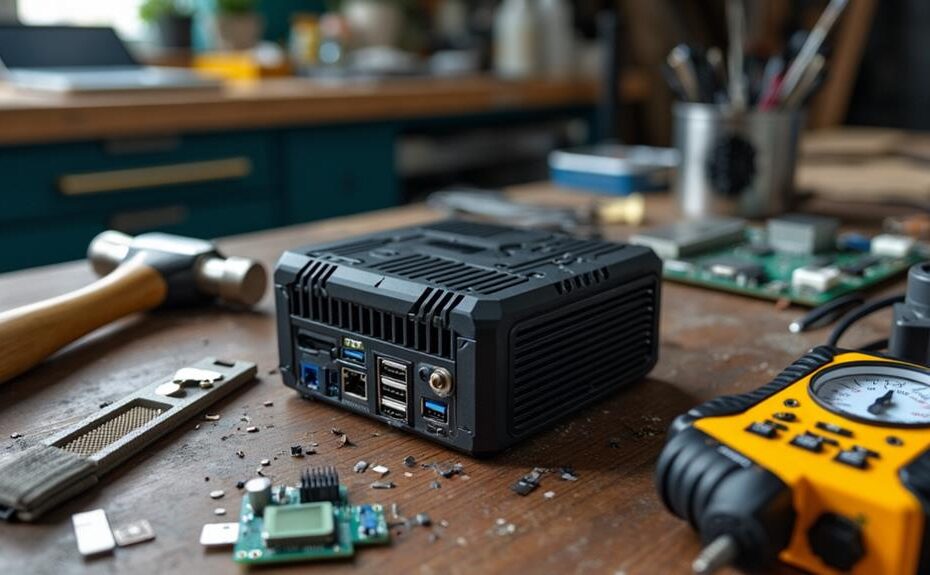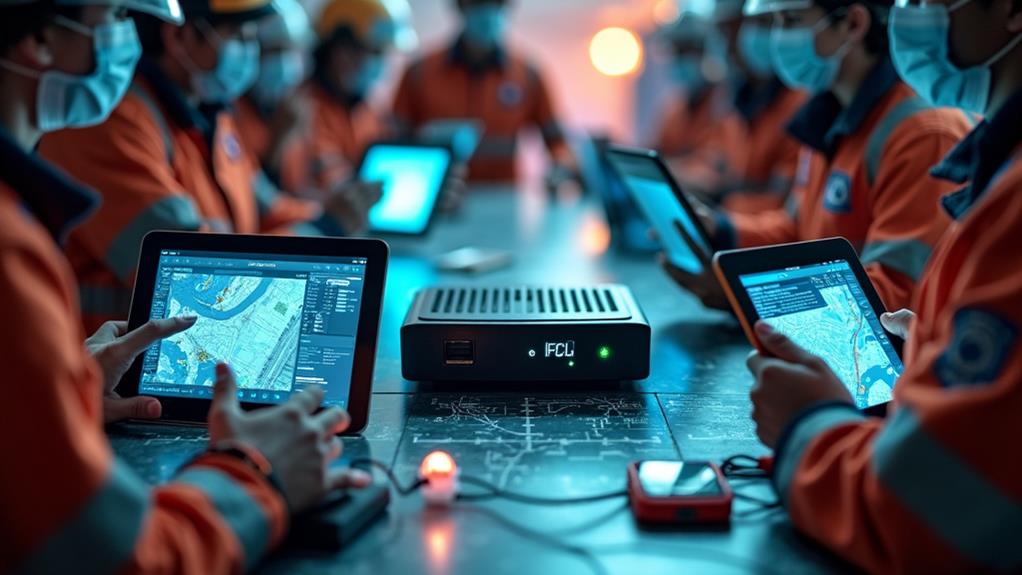



When you evaluate the durability of Mini PCs, consider several criteria. Focus on construction materials like aluminum that enhance heat dissipation and ruggedness. Environmental resistance is essential, too; a durable Mini PC withstands extreme temperatures and moisture. Assess the robustness of internal components; high-quality materials in motherboards and SSDs boost longevity. An efficient cooling system helps manage heat, while shock and vibration tolerance guarantees reliability in demanding conditions. Brand reliability, warranty support, and user reviews all provide insights into build quality. These factors collectively inform your decision on a Mini PC's durability and performance, and there's more to explore.
Key Takeaways
- Durable construction materials like aluminum and high-quality plastics enhance the structural integrity and heat dissipation of Mini PCs.
- Effective cooling systems, including fanless designs, prevent overheating and extend the lifespan of components.
- Environmental resistance features allow Mini PCs to function in extreme temperatures and protect against moisture and dust.
- Robust internal components, such as SSDs and high-quality motherboards, reduce failure rates and enhance longevity.
- User reviews and brand reliability provide valuable insights into the durability and performance of Mini PCs.
Construction Materials
When evaluating the durability of Mini PCs, the choice of construction materials plays an essential role. You'll notice that many manufacturers opt for durable materials like aluminum or high-quality plastic, enhancing the structural integrity and resistance to wear and tear. Aluminum, in particular, not only provides a robust exterior but also aids in heat dissipation, which is important for maintaining ideal performance over time. Additionally, many rugged mini PCs feature rugged sealed designs that protect against dust and moisture, making them ideal for harsh environments.
The integration of solid-state drives (SSDs) greatly contributes to durability as well. Unlike traditional hard drives, SSDs lack moving parts, reducing the risk of mechanical failure. This feature is especially beneficial in portable Mini PCs that may experience physical shocks and vibrations.
Reinforced chassis designs further protect internal components, ensuring that your device can endure various environments without compromising performance. Additionally, many Mini PCs utilize fanless designs with passive cooling technology, minimizing noise and the risk of failure associated with moving parts. By prioritizing these construction materials and design elements, you can confidently choose a Mini PC that promises longevity and reliability in your computing needs.
Environmental Resistance
Designed to thrive in challenging conditions, many Mini PCs excel in environmental resistance, a crucial factor for users needing reliable performance across various settings. These devices often feature rugged construction, enabling them to endure extreme temperatures ranging from -5°C to 50°C, thereby guaranteeing functionality in diverse environmental conditions. Additionally, many mini PCs exhibit low power consumption levels, enhancing energy efficiency and allowing them to operate effectively in various environments, which is a key aspect of their durability and performance. energy-efficient mini PCs often utilize fanless designs that promote silent operation, reducing dust entry and minimizing maintenance needs while prolonging the lifespan of your device. Some models even utilize waterproof materials, providing moisture resistance that protects internal components from damage in humid or wet environments.
The compact size and robust build quality of these Mini PCs are crucial, especially for industrial applications where space is limited. This design guarantees that they remain functional without sacrificing performance. Additionally, enhanced vibration resistance allows them to maintain operational reliability in environments with frequent movement or physical stress. By focusing on these features, you can select a Mini PC that meets your environmental resistance requirements, guaranteeing it stands up to the challenges of your work environment.
Internal Component Robustness
Environmental resistance is only one aspect of what makes Mini PCs reliable; the robustness of their internal components plays a significant role in their overall durability. High-quality materials are fundamental in constructing components like motherboards and processors, as they withstand heat and reduce failure rates. By incorporating solid-state drives (SSDs) instead of traditional hard disk drives (HDDs), Mini PCs enhance longevity and performance, since SSDs are more resistant to shock and vibration. This improvement is particularly beneficial in industrial applications where compact and energy-efficient designs are essential for operational efficiency.
The fanless designs commonly found in Mini PCs minimize dust accumulation and mechanical wear, leading to improved reliability of internal components over time. This design choice also supports efficient heat dissipation, guaranteeing that the system remains stable during demanding tasks. Furthermore, the use of SODIMM RAM contributes to compactness and maintains operational integrity under varying workloads.
Manufacturers often implement rigorous testing protocols for internal components, including temperature and stress tests. These measures guarantee that Mini PCs consistently operate reliably in diverse environments and under continuous use. Ultimately, the careful selection of internal components and their construction is critical to the durability and longevity of Mini PCs.
Cooling System Efficiency
Effective cooling systems are vital for maintaining the performance and longevity of Mini PCs. The efficiency of a cooling system greatly influences thermal management, as excessive heat can lead to hardware damage and reduced performance. Advanced technologies like heat pipes and passive cooling designs are increasingly common, allowing for effective heat dissipation without the noise of traditional fans. This not only enhances your experience but also contributes to a quieter workspace.
By utilizing materials with high thermal conductivity, such as aluminum for heat sinks, Mini PCs can maximize their cooling efficiency within compact designs. Many models incorporate smart thermal management features that automatically adjust fan speeds based on temperature readings, ensuring ideal cooling while minimizing energy consumption.
Fanless computers are an illustration of cooling system efficiency, relying on passive cooling to maintain temperatures without generating noise. This approach not only reduces wear on components but also helps prolong the lifespan of internal hardware by preventing thermal throttling. Ultimately, a well-designed cooling system is vital for sustaining performance and extending the life of your Mini PC, making it a key factor in evaluating durability.
Shock and Vibration Tolerance
While a well-optimized cooling system is fundamental for performance, the capability of a Mini PC to endure shock and vibration is equally important in determining its durability. Mini PCs designed for industrial use often feature rugged enclosures that provide shock resistance, allowing them to withstand impacts from accidental drops or vibrations. Many are tested to meet military standards, such as MIL-STD-810, ensuring reliability in demanding environments.
Incorporating solid-state drives (SSDs) instead of traditional hard disk drives (HDDs) enhances durability, as SSDs have no moving parts, making them less susceptible to damage from shocks. Manufacturers often specify a vibration tolerance range measured in G-force, indicating how well their Mini PCs can function in environments with consistent vibrations, like factory floors or vehicles.
Additionally, opting for a fanless design can increase durability by minimizing the risk of mechanical failure caused by dust and debris accumulation in moving parts. Ultimately, considering shock resistance and vibration tolerance is essential for anyone looking to invest in a Mini PC that can withstand the rigors of demanding applications.
Maintenance Requirements
To guarantee the longevity and ideal performance of your Mini PC, regular maintenance is essential. This includes routine software updates and internal cleaning to optimize performance and prevent overheating. Dust accumulation can greatly impede cooling efficiency, so make it a habit to clean the internal components periodically. Maintaining proper airflow is vital for temperature control, ensuring your device operates within the recommended operating temperature ranges.
Monitoring system performance and storage usage is another important aspect of maintenance requirements. By keeping an eye on these factors, you can identify potential issues early, allowing for timely upgrades or repairs that can prevent any long-term damage. Additionally, using surge protectors and uninterruptible power supplies (UPS) can help protect your Mini PC from electrical surges and power outages, both of which can severely impact longevity.
Brand Reliability
When it comes to Mini PCs, brand reliability plays an essential role in ensuring you get a durable and high-performing device. You'll often find that user reviews are invaluable for evaluating how consistently a brand delivers on performance and build quality. Established brands typically provide warranties and robust customer support, which reflects their confidence in the durability of their products.
Researching a brand's history can reveal patterns of reliability. Brands with a long-standing reputation often utilize quality components, resulting in enhanced overall durability and performance. Lesser-known manufacturers may cut corners, compromising on these vital aspects.
Moreover, industry awards and certifications can serve as indicators of brand reliability. Recognized brands frequently meet rigorous standards for both performance and durability in their Mini PC offerings. When choosing a Mini PC, it's wise to prioritize brands that have proven themselves over time. By focusing on reliable brands, you're more likely to invest in a Mini PC that stands the test of time, providing you with the performance and durability you need for your computing tasks.
Performance Longevity
Over time, the performance longevity of Mini PCs hinges on several essential factors, primarily the quality of components utilized in their construction. Reputable brands typically offer higher-grade materials that enhance durability and lifespan. When you choose a Mini PC, consider the cooling systems integrated into the design. Efficient heat dissipation is vital; it reduces thermal stress on components and prevents overheating, which can lead to performance degradation.
Regular maintenance is another key element. Performing routine cleaning and software updates helps optimize performance longevity and keeps your system running smoothly. If you're operating in demanding environments, look for Mini PCs built with industrial-grade materials. These models can withstand harsher conditions, further contributing to extended performance.
Additionally, user reviews and manufacturer warranties can provide valuable insights into the expected performance longevity of specific Mini PC models. By analyzing these aspects, you can make informed choices that align with your needs. Ultimately, understanding how these factors interplay will help you select a Mini PC that not only meets your immediate requirements but also stands the test of time.
Warranty and Support
Warranty and support play an essential role in the overall durability and reliability of Mini PCs. A thorough warranty, typically spanning one to three years, assures you that your device is protected against manufacturing defects. This assurance can greatly bolster your confidence in the Mini PC's long-term performance.
Customer support is another critical factor; the responsiveness and availability of support services can greatly influence your user experience. Reputable brands often provide 24/7 support and extensive online resources, ensuring you have assistance whenever needed.
The extent of warranty coverage, including parts and labor, is crucial too. Some manufacturers offer extended warranties for an additional fee, enhancing your peace of mind regarding durability. Additionally, accidental damage protection plans can cover unintended harm, further improving your Mini PC's perceived reliability.
Lastly, while we won't explore user reviews here, it's worth noting that feedback about post-sales support can offer valuable insights into the effectiveness of a manufacturer's warranty service. Overall, a solid warranty and robust customer support framework are essential components that contribute greatly to the durability and reliability of Mini PCs.
User Reviews and Feedback
User reviews and feedback provide valuable insights into the durability and overall performance of Mini PCs, often reflecting real-world experiences that go beyond manufacturer claims. Many users emphasize the build quality of their devices, noting that robust materials and well-engineered designs lead to enhanced durability. You'll find that brand reputation plays a noteworthy role in perceived reliability, as established manufacturers typically earn higher ratings for longevity.
Feedback often highlights the effectiveness of cooling systems, with users reporting that efficient heat dissipation is essential in preventing overheating and extending the Mini PC's lifespan. Additionally, customer support emerges as a key factor; responsive service can greatly boost user satisfaction and confidence in the device's durability.
Moreover, many customers share their experiences regarding upgradeability. Positive reviews frequently mention how easy it is to maintain and upgrade components, which can further extend the Mini PC's usable life. Overall, user reviews serve as an important resource, shedding light on the essential aspects of build quality, cooling systems, and customer support, helping you make an informed decision about the durability of Mini PCs.
Disclosure: As an Amazon Associate, I earn from qualifying purchases.






